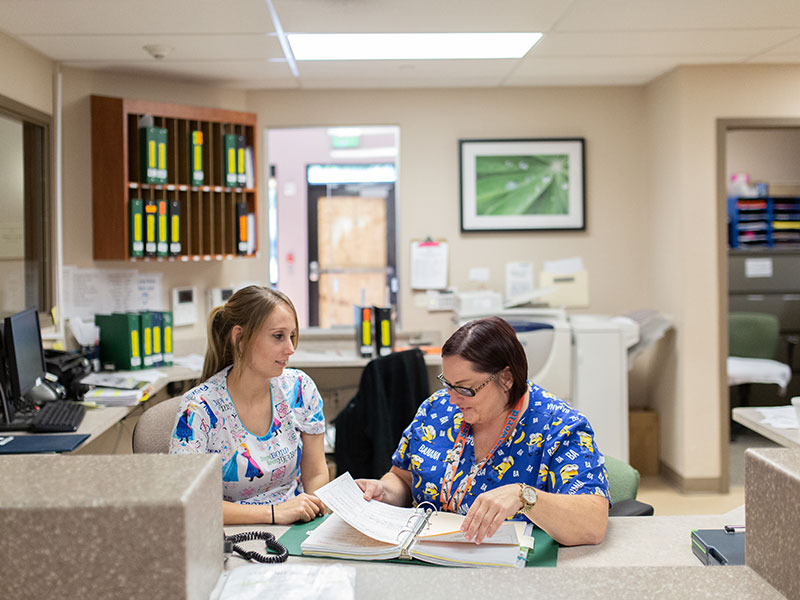Cedar Crest Hospital & Residential Treatment Center helps individuals who are struggling with bipolar disorder find long-term recovery. Located in Belton, TX, Cedar Crest is the leader in mental health care.
Bipolar Disorder Treatment
Learn more about bipolar disorder treatment at Cedar Crest Hospital & Residential Treatment Center in Belton, TX
If you or your loved one has bipolar disorder, you probably feel life is a rollercoaster of good weeks and bad, amazing days and horrible ones. Bipolar disorder is a mental disorder characterized by extreme shifts in mood from the high highs of mania to the low lows of deep depression. When you’re in a manic phase, you probably feel physically high, chatter to anyone nearby, thoughts whirling, forming plans you’re just positive will work. The next moment, you’re so low you don’t even know why you bother getting out of bed. You feel hopeless about the future, scared that nothing with ever be okay, and frustrated by the decisions you made while manic. Life doesn’t have to feel like a bad rollercoaster ride.
At Cedar Crest, a hospital for bipolar disorder in Belton, we’ve been helping men, women, children, teens, and older adults who are struggling with bipolar disorder. Our serene, welcoming campus provides the ideal escape for you to learn, grow, and begin the journey toward recovery.
How to Help a Loved One
Helping a loved one get treatment for bipolar disorder
If your loved one has bipolar disorder, you’re probably well-aware of how the cycles affect him or her. During the frantic manic phase, your loved one is so, so up, waking you up at 3 in the morning to tell you about his or her grand scheme. When your loved one is depressed, you feel helpless as you watch him or her struggle to perform even the simplest of tasks. You fear for your loved one’s safety during a “mixed state” in which he or she is manic and depressed at the same time, which can lead to extremely devastating consequences. You know that it’s time to help your loved one seek inpatient treatment to allow for their recovery, but you may not know how to guide them in that direction. Here are some tips for guiding your loved one into treatment for bipolar disorder:
Get help first: Before you are able to help your loved one, you need to seek support and help for yourself. Find an area support group for families of people with bipolar disorder, check in regularly with a therapist, and find appropriate outlets for your emotions.
Learn about bipolar disorder: Bipolar disorder is a complex disorder that can lead to a number of serious consequences if left untreated and unmanaged. Bring what you’ve learned to your loved one to explain why you’re concerned. Be persistent but gentle with your loved one, assure them that you will be alongside them every step of the way.
Find a treatment center: Research treatment centers that have a history of treating people with bipolar disorder beginning on their journey toward recovery. Make an appointment with intake staff who are able to answer any questions you may have about the way in which they treat people who have bipolar disorder. Arrange a tour of the facility with your loved one to alleviate any anxiety about inpatient treatment.
Why Consider Treatment
Why consider treatment for bipolar disorder at Cedar Crest Hospital & Residential Treatment Center in Belton, TX
If you’ve been living with bipolar disorder, you’re probably struggling with a number of negative effects caused by your behavior while manic. Perhaps you’ve spent all of your savings, quit your job on a whim, moved across the country, and find yourself having to face these problems alone. Maybe you’ve taken up drugs or alcohol as an attempt to self-medicate the symptoms you’re experiencing, leading to dependence and addiction and complicating your bipolar disorder. Perhaps you’ve been acutely suicidal during a mixed state and are only now dealing with your near-brush with dying. Life with bipolar disorder is never dull, but it can be highly stressful and dangerous.
An inpatient treatment center with a proven success record for helping to heal those with bipolar disorder can help you make the first steps toward dealing with your journey toward recovery. Through removing yourself from the stresses of everyday life and entering calming inpatient treatment, you’ll be able to spend time focusing upon what matters most – recovery. Treatment for bipolar disorder should always aim to treat the whole person, not simply the symptoms you’re experiencing when you arrive. In treatment, you’ll learn the skills necessary for continued success in your healing and help you develop coping strategies for handling the stresses in your life.
Our Philosophy
Cedar Crest Hospital & Residential Treatment Center philosophy and benefits
At Cedar Crest, a bipolar disorder treatment center in Belton, our mission is to set ourselves apart by offering individualized, superior care that improves the quality of life for our clients, their families, and the community at large. Our bipolar disorder treatment center strives to be an ever-improving care center that redefines the way mental health care is given. We provide individualized treatment that helps to heal the whole person – mind, body, and spirit. Each person who comes to us for care will be treated with the dignity and respect they deserve by our compassionate, multidisciplinary treatment team.
Types of Treatment
Types of bipolar disorder treatment offered at Cedar Crest Hospital & Residential Treatment Center in Belton, TX
Bipolar disorder requires ongoing care, even during periods in which you are feeling better. When you come to us for help, you’ll first undergo a series of evaluations and examinations to help us best determine the most appropriate treatment plan that meets all of your needs. Our medical examination can help us determine if you’re struggling with any medical conditions as a result of your bipolar disorder. During our psychiatric evaluation, we’ll determine the type of bipolar disorder, severity, and diagnose any co-occurring disorders. After we obtain the results of these evaluations, we’ll sit down with you to work out a plan of care for your stay with us.
Medication is one of the cornerstones of bipolar disorder treatment at our hospital and there are a variety of medications that are used (often concurrently) to manage the symptoms. These include mood stabilizers, antipsychotics, anticonvulsants, antidepressants, and/or benzodiazepines. Medication usage will be monitored closely by your treatment team and will be adjusted as needed throughout your stay.
Individual therapy at our treatment center allows you the one-on-one time to work with a therapist and address topics related to your diagnosis and recovery. Cognitive-behavioral therapy is the most common form of therapy used for people who have bipolar disorder. In CBT, you’ll learn to identify unhealthy, negative thoughts and behaviors and replace them with positive, healthy thoughts and behaviors. CBT can also help you to learn about triggers for bipolar disorder and tips for stress reduction.
Group therapy is a valuable part of your stay at our hospital as it will allow you to interact with others who may be struggling with similar issues so that you all help each other grow, learn, and heal. You’ll learn more about bipolar disorder, the importance of medication management, as well as process some of the emotions you have surrounding the disorder.
Family therapy is crucial for your recovery at our treatment center as it will allow you to mend fences with those you may have grown estranged from. You’ll work together to identify family dynamics that may have contributed to the development of bipolar disorder and allow your family the chance to express ways in which your bipolar disorder has impacted their lives. Additionally, we’ll connect your family with community resources to assist in their continued recovery.
In addition to standard therapies we use to treat bipolar disorder, we also offer a variety of experiential methods designed to complement our traditional approaches. These may include:
- Yoga
- Recreational therapy
- Art therapy
- Music therapy
- Swimming pool
Continuing Care
Continuing care and levels of treatment for bipolar disorder
We’re proud to offer a number of treatment options designed to help children, teens, adults, and seniors struggling with bipolar disorder. Our treatment and care won’t stop upon discharge – we are always available 24/7 to offer help and guidance.
When you no longer require the structure of our inpatient treatment, you and your loved ones will sit down to discuss your continuing care options. Our social worker will provide you with information about local support services, help you cope with the transition out of inpatient treatment, and help create continued treatment goals with you to ensure continuity of care and treatment.
Some people step down into structured outpatient treatment like an intensive outpatient program (IOP) or partial hospitalization program (PHP), both of which allow for recovery and treatment during the day while slowly integrating back into regular life in the evenings. Others may feel they’ve made enough progress and are ready for discharge with referrals to our traditional outpatient therapy clinic. At our bipolar disorder treatment center, we’ll strive to help each client who comes to us for help long after they leave our doors.

















